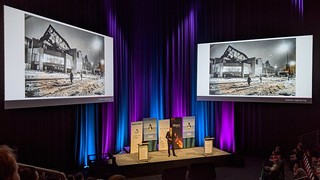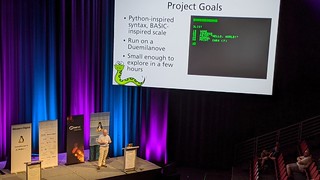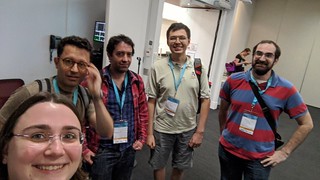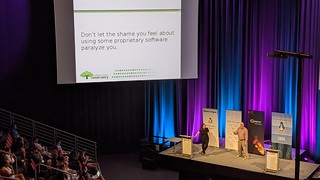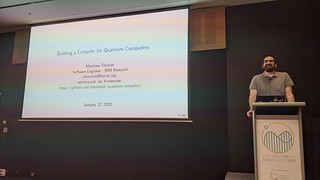I already wrote about the tourist stuff I did while in Brisbane and Gold Coast, but the actual reason for my trip to Australia was to present at Linux.conf.au (LCA).
One of the things that is particularly remarkable about LCA is the length of the conference. Most conferences I go to top out at three days, with one or two tutorial or community days thrown in for particularly invested community members. With LCA you have two days of mini-confs, but the quality of those events is just as high as the main conference. If I’m flying to the other side of the world, you bet I’ll attend those days too, and submit talks to a mini-conf. Add in travel time and a weekend of tourist stuff before the event so I can adjust to the time zone a little before giving my talks, and we’re talking about a 10 day trip. This has always thrown a wrench in my normal work, but this year it was definitely worse. With more considerable family obligations to come home to and an important launch at work on the horizon (which was thankfully pushed, but I didn’t know until I got home!), it’s taken me some time to catch up and finally sit down to write about the event.
I spent Monday morning in the Sysadmin Miniconf, as I typically do. We heard talks covering the latest from OpenZFS and Samba, a cultural look at DevOps, and a fascinating talk from Craig Miskell about why we all should probably stop running our cron jobs on the hour (random is better!) and his journey to debug failures at GitLab related to the practice.
Then I had to get into the right head space for my talk, which included enjoying some Indian food for lunch with some of my LCA buddies. My sysadmin mini-conf talk was on “Why Linux Systems Administrators Should Care About the Mainframe,” (slides, video) which started out as a lightning talk, but was expanded to a 25 minute talk by the time I arrived! I had to add some last minute content to account for that, but I think the talk went well. It was nice to have a talk so early in the week, too. It put me in touch with other IBM Z folks at the conference very quickly, and others who were using mainframes and were surprised to see mainframe content at the conference. For me, it was nice to sync up with some Australians, since most of the data I had for my talks was still US-centric, and I was weaker than I had planned on being about mainframe usage in Asia/Pacific. Plus, it was reassuring to know there were folks in the audience who were truly invested in the technology and interested to be there. I think my favorite comment though came from a fellow who only attended my talk because it was in the sysadmin mini-conf room, and admitted “I thought it would be boring, but it wasn’t!” High praise, right there!
On Tuesday the morning kicked off with a women in open technology breakfast. I’m quite shy at these “working breakfast” type events, but I was able to find my voice and chime in a bit, and I’m glad I went. The keynote that morning was probably my favorite of the conference, hearing from Dr. Sean Brady who spoke to the dangers of expertise. Through a series of stories and priming techniques, he demonstrated the glaring blind spots that our expertise can get us into, and pulled it back into engineering, both in the architectural sense and as broader technologists.
Other highlights included Wednesday when I went to a really fun talk by Keith Packard on Snek. He detailed his work teaching young students programming, and ended up developing a Python-compatible language called Snek to aid in his goals. Drawing from languages like Logo (turtle!), he wanted to make the experience simple and exciting, but still actually useful for students. It was also interesting to hear him talk some about the cultural side of teaching children programming, and that a non-competitive environment tends to work best (Hackathons need not apply). Finally, he announced a crowdsourcing campaign of SnekBoard, “an open-hardware python microcontroller for LEGO®”. Naturally, I backed it.
My second talk of the event was also on Wednesday, “Linux in the Cloud, on Prem, or… on a Mainframe?” linux.conf.au (slides, video). I had to borrow some material from this talk to flesh out my talk on Monday, but this talk had a different focus, more about the open source technologies that have enabled the modern mainframe running Linux to have a place at the table alongside other Linux-based offerings, both in the cloud and on premises. Unfortunately my talk was at the same time as the OpenPOWER talk by the great Hugh Blemings, but Andrew Donnellan from the Power side came over to see my talk, and Hugh brought the rest of his Power crew over to my room to say hello once our talks were completed. With my friend Matthew Treinish of IBM Quantum there too, we got a fun picture covering IBM Systems: Power, Q, and Z!
Thursday included a talk from Robert Collins on why making broad assumptions about technology you don’t care for (like NTFS on Windows) does you, your project, and your community a disservice. He documented how he able to make the installation of Rust using Rustup considerably faster by throwing away assumptions that others had made and spending time doing a bunch of low-level debugging. Plus, it was an entertaining story. I also heard from Bradley M. Kuhn and Karen Sandler in a talk I admit I didn’t expect: one where they talked about the inherent privilege in being able to craft your life around being fully open source. We have gotten to a point in the open source movement where there’s a “holier than thou” attitude around just how open source you can be, and while it can be an interesting hobby for die-hard enthusiasts, at the end of the day not everyone is able to do it. When the proprietary app on the only phone you can afford saves you money on groceries and every dollar matters, you’re going to use that app. The talk sought to reign in this kind of attitude and be kinder to each other, and I was really happy to see it come from representatives of the Software Freedom Conservancy, which people in our communities tend to respect in this area.
On Friday I got to hear from my buddy Matt actually talk about quantum computers in his talk on quantum compilers. Being at IBM, I probably have more exposure to them than the average person, but my grasp on how they work is basic, at best. The talk was a fascinating glimpse into probabilities and optimizations that needed to be made for quantum compilers to come out with accurate results. It’s still brain-bending stuff, but at least I understand a little bit more now.
The conference concluded with a series of fun lightning talks, one of which had the location of the next LCA embedded in it, Canberra! I’ve never been to the Capital before, and as LCA remains one of my favorite conferences, I hope I can make it next year.
More photos from the conference here: https://www.flickr.com/photos/pleia2/albums/72157712791312518. And the LCA YouTube account has a playlist that includes keynotes and talks, here: https://www.youtube.com/user/linuxconfau2019/playlists.



